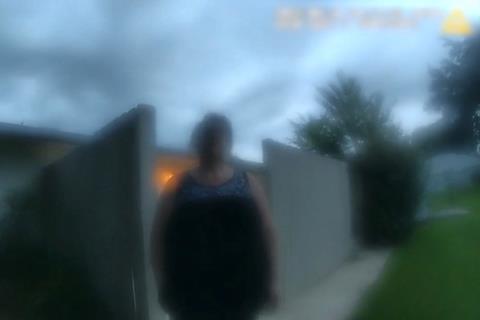No-frills documentary recounts the shocking 2023 murder of a Black American woman through police bodycam footage

Dir: Geeta Gandbhir. US. 2025. 97mins
A chilling documentary that, in its own sombre, subdued way, encapsulates many of the ills affecting the US, The Perfect Neighbor incorporates police bodycam footage and law enforcement interrogations to recount a 2023 fatal shooting in Florida that challenged that state’s controversial ‘stand your ground’ law. Over the course of 16 months, tensions escalate between a middle-aged white woman and the mostly Black children who play in her neighbourhood, the verbal standoff eventually leading to murder. Director Geeta Gandbhir uses this existing material to tell a tragic story that touches on America’s seemingly intractable struggles with racism, gun violence and mental health.
A damning portrait of an America in which Black people face an unequal justice system
The film screens as part of Sundance’s US Documentary Competition, and the timely subject matter should guarantee further festival play and theatrical distribution. The 2023 killing of Black mother of four Ajike “AJ” Owens by her neighbour Susan Lorincz – who said she believed Owens was going to kill her – made national news, but even those familiar with the incident should be riveted. And while the nonfiction streaming space is overstuffed with melodramatic true-crime series filled with law enforcement footage, Gandbhir’s film, deftly edited by Viridiana Lieberman, eschews the genre’s most salacious cliches.
Much of the film is seen through the perspective of the smudgy, slightly fisheye digital cameras that American law enforcement wear on their chests. Starting in February 2022, cops were dispatched to Lorincz’s home fairly frequently, to attend her constant complaints that the neighbours’ children were trespassing on her property. When the police speak to her and then the children (and their parents), they hear wildly different stories. The neighbours adamantly insist that Lorincz is actually the instigator, swearing at the kids and even hurling racial epithets. (Besides, the children are not trespassing because she doesn’t own the open field where they play.)
These seemingly repetitive police encounters with Lorincz start to become unnerving, as her anger begins to feel irrational and dangerous. The more the Black residents explain her baseless accusations and erratic behaviour — at one point, they say, she was standing outside brandishing a firearm — the more audiences will surmise that this woman isn’t just mistaken, but may also be racially biased in her complaints. Then, during a later confrontation with police, Lorincz mentions needing medication and makes a vague reference to having been raped in the past. With the verite-like camerawork offering a viewpoint that is queasily unfiltered and raw, it becomes clear something terrible is going to transpire before the fatal shooting occurs.
Gandbhir, who has won two Emmys for editing and co-directed the 2017 documentary I Am Evidence, lets the footage speak for itself, allowing the story’s inherent drama and social commentary to slowly emerge. Equally, Laura Heinzinger’s understated score and sound design enhance the sense of dread and sorrow without becoming manipulative. The Perfect Neighbor’s sombrely objective approach invites audiences to discover how this tragedy unfolded and speculate what, if anything, could have prevented it.
The documentary is especially pointed in its examination of Florida’s ’stand your ground’ law, which argues that defendants can claim they wielded deadly force simply because they believed they were in danger. Gandbhir presents a damning portrait of an America in which Black people face an unequal justice system and, as a closing title card indicates, are much less likely to be acquitted when invoking this same law. And while The Perfect Neighbor never uses this as an excuse, Lorincz’s claims of suffering sexual abuse and mental illness add another dark wrinkle to this sad story — why was someone so apparently unwell allowed to have a gun in the first place?
Such painful questions remain unanswered as The Perfect Neighbor reaches its finale, which features footage from Lorincz’s trial. But Gandbhir is less interested in the particulars of this specific crime than she is in the predictability of its contours, her no-frills approach ephasising the despairing familiarity of the paranoia, bigotry and violence coursing through too many American neighbourhoods.
Production company: Message Pictures
International sales: Cinetic Media, Eric Sloss, Eric@cineticmedia.com
Producers: Alisa Payne, Geeta Gandbhir, Nikon Kwantu, Sam Bisbee
Editing: Viridiana Lieberman
Music: Laura Heinzinger
























